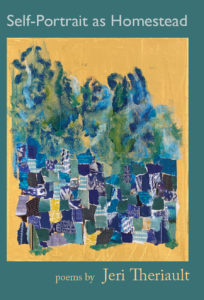 Review by Claire Raymond
Review by Claire Raymond
Franco-American poet Jeri Theriault’s Self-Portrait as Homestead envisions the marks that our histories leave on our bodies and on the houses that hold our bodies as we pass through them, bringing together domestic space and identity in elegant, if at times emotionally painful, poems. Although the revelations of the book can be intimate, bringing us into tender family and personal histories, the tone is notably restrained. The poems keep a kind of sacred distance from their subject matter, granting the reader a clear and luminous space to encounter the poet’s words. The poems’ structures are solid, stable, and at times stately, fitting the subject matter of how the material world contains and becomes our losses. The poet’s immersion in Maine precedes and includes her life, as the poems reach back through family memory of the Franco-American experience in Maine not only as the poet experiences but also as through her voice deceased relatives speak. It is a book deeply grounded in the oppressed lives of cisgender women, mourning in a dry and subtle key the lost potential of women trapped in rigid traditional gender roles. While the book’s title suggests that the poems are about the “self” paradoxically the book’s project is of deconstructing the idea of self, remaking self as a conglomeration of fragments that cohere – self is made of the speaker’s mother, father, cousins, and mémère; self is made of houses once inhabited, husbands once married. Here, self is uncannily decentralized – for the project of Self-Portrait as Homestead is to reencounter the way that the built spaces that hold us, and the people who create and shape us, are fragile and vanishing and in partaking of these mortal nouns the “self” is never central – even though she (the speaker is gendered she/her/hers) builds the book’s spare architecture in her steady voice.
There is a persistent insistence on feminine and cisgendered female power in Theriault’s work. The speaker references her hysterectomy in the title poem, understanding the “house” of her body continues to be her own even as it carries scars (p.86). In the elegantly understated poem “On Returning to My Childhood Church for My Father’s Funeral” (p.13) the speaker does not mention the father in the poem. Instead, the poem meditates on the Catholic faith in which she no longer believes, noting rather that it is female power that centers and anchors her, culminating the poem with the image of her cousin singing Ave Maria. Theriault’s poems frequently use as titles physical addresses of places in central Maine where the poet’s family lived and lives, creating a sense of a populated village of the living and the dead in the material plane of the poems. In “23 Campbell Street” the speakers notes “I want so much from the past and isn’t a house a harbinger/of future endings,” concisely indicating the evocative paradox that is the engine of the book: the longing to resolve the past and the understanding that the past is itself a sign of endings, of what will be lost as the future arrives (p.23). The mournfulness of the collection is present in its subject matter – funerals, reimagining the lives and voices of the deceased, putting away the belongings of the dead – but the language continues to seek and find the new, the fresh, the continued source of force. In “Grandmother as Scylla” the bleak assessment “Growing old is erasure” is met with the countering image of the grandmother as Scylla, the powerful feminine monster of Greek mythology (p.81). “Woman as Verb” dazzlingly pulls the image of mémère hanging sheets on the laundry line into a trope for survival. Quilting, the women of the family “remake/ the world with words and stitches” and yet in the clear-eyed vision of the poet this activity is not sentimentalized but anchored in the imagery of spiders pushed to the margins of built spaces.
It is the unflinchingly accurate drive of the poet’s vision that makes the poems so unexpectedly moving. On first read, their dry and detached tone and the concision and restraint of the language create contemplation. But as one remembers back through the poems the force of mourning surfaces and one is brought into an intimacy that aches with clarity. Theriault’s understated aesthetic works with a kind of astringent effect, pulling us through the labyrinth of family history, gendered oppressions, and writing as a lifeblood of survival – familial, cultural, personal. The book’s deft concision belies the breadth and depth and force of its reach. This is a landmark book for Maine, offering a deeply personal vision of the Franco-American experience here.
Self-Portrait as Homestead by Jeri Theriault
Deerbrook Editions 2024
ISBN: 979-8-9865052-4-4
6 x 9; 96 pages; $18.95
Claire Raymond is the author of several books on feminist visual culture, including Women Photographers and Feminist Aesthetics. Publishing under her middle name Claire Millikin, she is also the author of ten collections of poetry, including the forthcoming Magicicada. Millikin lives in rural coastal Maine and teaches for the University of Maine system.
